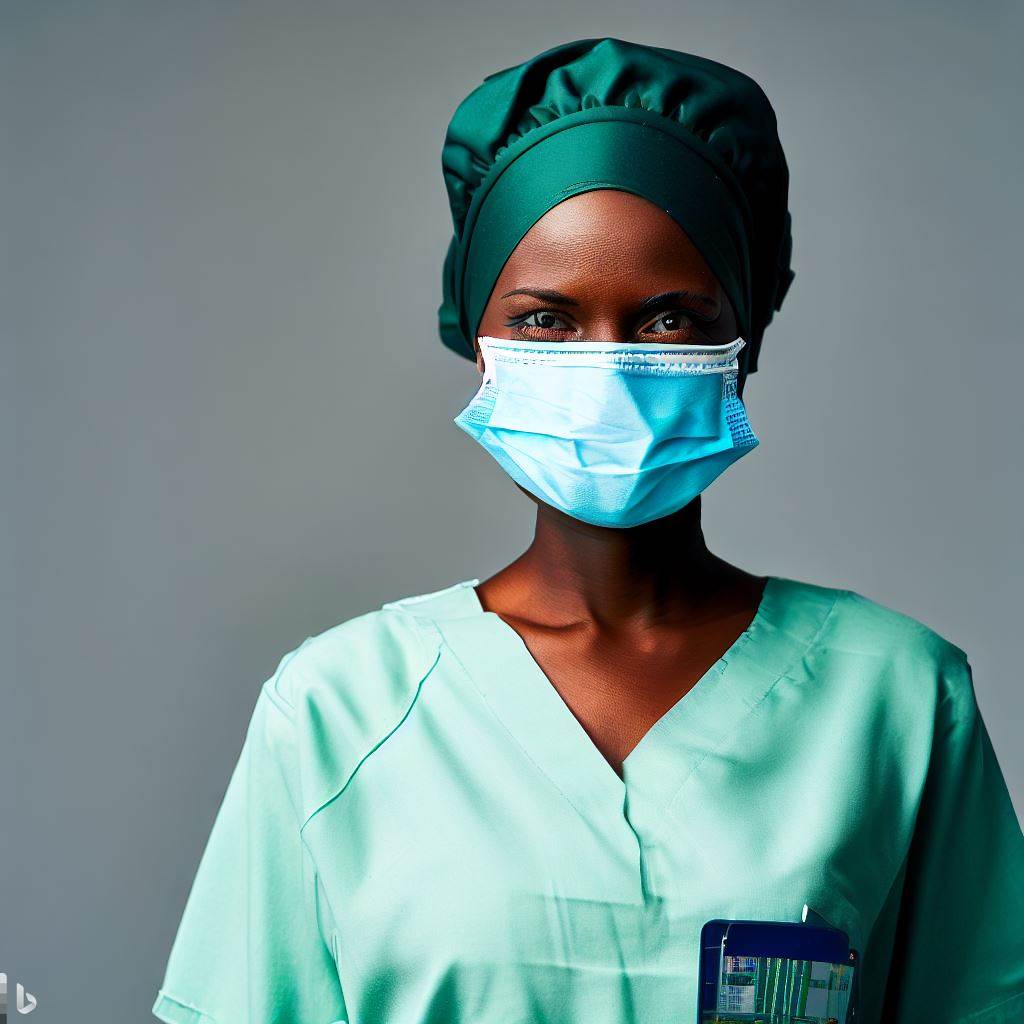Introduction
MRI technology is a cornerstone of modern healthcare, enabling the diagnosis and monitoring of diverse medical conditions.
In this blog post, we delve into the daily life of an MRI tech in Nigeria, shedding light on their vital role in patient care. From operating advanced MRI scanners to ensuring accurate imaging, MRI techs play a critical part in healthcare delivery.
We will explore their responsibilities, challenges, and the impact they make in providing precise diagnoses and improving patient outcomes.
Gain a deeper understanding of the invaluable contributions of MRI techs to the Nigerian healthcare landscape.
Background on MRI Technology in Nigeria
An overview of the current state of healthcare in Nigeria
Nigeria faces numerous healthcare challenges due to inadequate infrastructure and limited resources.
The country has a high burden of disease, including communicable and non-communicable diseases.
Healthcare services are often inaccessible or unaffordable for many Nigerians, especially those in rural areas.
The healthcare system suffers from a shortage of qualified healthcare professionals, including doctors and nurses.
There is a need to improve healthcare financing and increase investments in the sector to enhance quality and access
The availability and utilization of MRI technology in the country
MRI (Magnetic Resonance Imaging) technology is available in Nigeria, primarily in major cities and private hospitals.
Public hospitals often lack access to MRI technology due to the high cost of installation and maintenance.
A large percentage of the population does not have access to MRI scans due to the limited number of machines.
Patients who require an MRI often face long wait times and have to travel long distances to access the technology.
Private clinics and diagnostic centers are increasingly investing in MRI machines to meet the growing demand.
The significance of MRI techs in the healthcare system
- MRI techs play a crucial role in the diagnosis and treatment of various medical conditions.
- They operate the MRI machines, ensuring accurate and high-quality imaging results for physicians.
- MRI techs are responsible for patient safety and comfort during the scanning process.
- They collaborate with radiologists and other healthcare professionals to interpret and analyze MRI images.
- The expertise and skills of MRI techs contribute to better patient outcomes and clinical decision-making.
Basically, Nigeria’s healthcare system faces numerous challenges, including inadequate infrastructure, limited resources, and a shortage of qualified healthcare professionals.
MRI technology, while available in the country, remains inaccessible to a large percentage of the population due to its cost and limited availability. MRI techs play a significant role in the healthcare system, ensuring accurate imaging results and contributing to improved patient outcomes.
However, there is a need for increased investment in healthcare infrastructure and resources to enhance the accessibility and utilization of MRI technology in Nigeria.
Read: Pharmacy Technician Role: An In-Depth Look in Nigeria
Overview of the Role of an MRI Tech
Responsibilities of MRI Techs
- Administering MRI scans to patients using specialized equipment and following safety protocols.
- Preparing patients for the scan by explaining the procedure and answering any questions or concerns.
- Operating the MRI machine and adjusting settings to capture high-quality images.
- Reviewing patient medical history and ensuring they meet the necessary criteria for the scan.
- Monitoring patients during the procedure for any adverse reactions or discomfort.
- Keeping accurate records of each scan performed, including patient details and scan settings.
MRI Techs’ Role in Operating MRI Machines and Capturing Images
- An MRI tech is responsible for positioning patients correctly inside the MRI machine to obtain the desired images.
- They ensure that patients are comfortable and still during the scan to avoid blurred or distorted images.
- MRI techs adjust the machine’s parameters to obtain the best resolution and contrast for each scan.
- They must possess technical knowledge to troubleshoot any issues that may arise during the scan.
- Monitoring the scan progress and communicating with the radiologist to ensure the quality of the images.
Importance of Communication Skills with Patients
- MRI techs play a crucial role in alleviating patient anxiety by providing clear and concise instructions.
- Explaining the procedure and addressing any concerns helps patients feel more comfortable and cooperative.
- Effective communication ensures that patients understand the importance of remaining still during the scan.
- Building rapport with patients helps create a trusting and cooperative environment for successful imaging.
- Understanding and empathizing with patient needs and concerns contribute to a positive patient experience.
As an MRI tech, the responsibilities extend beyond operating the machine and capturing images.
It involves providing compassionate patient care, maintaining equipment, and collaborating with other healthcare professionals.
The effective communication skills possessed by MRI techs help create a comfortable and safe environment for patients undergoing MRI scans.
Read: Challenges Faced by Automation Engineers in Nigeria
A Typical Day for a Nigerian MRI Tech
The Start of the Day – Preparing the MRI Machine and Workspace
As a Nigerian MRI tech, my day begins by ensuring that the MRI machine and workspace are ready for use. I carefully inspect the machine for any technical issues or malfunctions.
Next, I ensure that all necessary supplies, such as contrast media and patient gowns, are stocked and readily available.
The cleanliness of the workspace is also of utmost importance, as it contributes to the overall safety and efficiency of the scanning process.
The Patient Intake Process and Ensuring Safety Precautions are Followed
Once the MRI machine and workspace are prepared, the next step involves the patient intake process. Patient safety is a top priority, and I need to ensure that all safety precautions are followed.
I greet the patients, verify their identity, and explain the procedure to them in a clear and concise manner. It is crucial to obtain their informed consent and address any concerns they may have.
Additionally, I screen the patients for any contraindications or conditions that could potentially affect the MRI scan.
To guarantee a safe environment, I carefully screen the patients for any metal objects or implants that may interfere with the scanning process.
This involves asking detailed questions and requesting removal of any metallic items, such as jewelry or piercings.
The Steps Involved in Conducting an MRI Scan
Conducting an MRI scan involves a series of specific steps to ensure accurate and detailed imaging. Firstly, I position the patients on the MRI table, ensuring their comfort and proper alignment with the machine.
I then administer contrast media, if required, according to the specific instructions provided by the radiologist or physician.
It is crucial to carefully monitor the patients during the scan, ensuring their well-being and addressing any discomfort they may experience.
Throughout the scan, I constantly adjust the MRI machine settings, such as the slice thickness and sequence parameters, to capture the desired images.
Collaboration with the radiologist is vital, as their expertise helps in obtaining the most diagnostic images.
Collaboration with Radiologists and Physicians for Accurate Diagnosis
As a Nigerian MRI tech, I work closely with radiologists and physicians to achieve accurate diagnoses for our patients. This collaboration involves constant communication and sharing of information.
During the scanning process, I consult with the radiologist or physician to obtain their input on specific imaging requirements and adjustments.
This collaborative approach ensures that the images captured are tailored to their diagnostic needs.
After the scan is completed, the radiologist reviews the images and interprets the findings.
Through discussions and consultations, we collectively aim to provide accurate diagnoses and formulate appropriate treatment plans for the patients.
Challenges and Problem-Solving Skills Required During the Day
Being an MRI tech in Nigeria comes with its own set of challenges. Limited resources, power outages, and equipment maintenance issues can often disrupt the smooth workflow.
However, problem-solving skills are essential to overcome these challenges efficiently.
Adaptability and creativity are crucial when faced with resource limitations or technical difficulties. It requires thinking outside the box to find alternative solutions and ensure patient care is not compromised.
Additionally, effective communication skills are necessary to address any unforeseen circumstances or patient concerns promptly.
Being able to handle stressful situations calmly and efficiently while maintaining a high standard of care is an essential skill for a Nigerian MRI tech.
In summary, a typical day for a Nigerian MRI tech involves various tasks, from preparing the MRI machine and workspace to collaborating with radiologists for accurate diagnosis.
Despite the challenges, the dedication and problem-solving skills of an MRI tech contribute significantly to patient care and the field of medical imaging in Nigeria.
Read: How to Become a Robotics Engineer in Nigeria

Learn More: Role of Dentists in Nigeria’s Healthcare System
Skill Requirements and Training for Nigerian MRI Techs
Necessary Qualifications and Education for Becoming an MRI Tech
- Must hold a Bachelor’s degree in Radiologic Technology or a related field.
- Completion of an accredited MRI technologist program is necessary.
- Strong foundation in basic medical sciences, including anatomy and physiology.
- Proficiency in operating MRI equipment and understanding the technical aspects.
- Extensive knowledge of radiographic positioning and patient care techniques.
- Excellent communication skills to effectively interact with patients and the medical team.
These qualifications are essential for a Nigerian MRI tech to perform their duties efficiently and accurately.
The education and training provide the necessary foundation for their roles, ensuring they can provide quality healthcare.
Importance of Continuous Professional Development and Staying Updated
- Medical imaging technology is constantly evolving, requiring techs to stay updated with the latest advancements.
- Continuous professional development ensures Nigerian MRI techs remain competent and knowledgeable.
- Allows techs to provide accurate diagnoses, deliver quality patient care, and maintain professional standards.
- Professional development also enhances critical thinking skills and problem-solving abilities.
- Enables techs to adapt to new imaging technologies, protocols, and safety guidelines.
- Active participation in workshops, conferences, and seminars keeps techs informed and connected to their field.
Continuous learning and staying updated is crucial for Nigerian MRI techs to deliver the best possible outcomes for patients while adhering to international standards of practice.
Specialized Training and Certifications Required in Nigeria
- In addition to a Bachelor’s degree and MRI technologist program, techs require registration with the Radiographers Registration Board of Nigeria (RRBN).
- The RRBN ensures regulatory compliance, professional conduct, and proficiency in the field.
- Advanced certifications such as the Advanced Cardiac Life Support (ACLS) and Basic Life Support (BLS) are also beneficial.
- Specialized training may be required for specific MRI techniques, such as magnetic resonance angiography (MRA) or musculoskeletal MRI.
- Further certifications from organizations like the American Registry of Radiologic Technologists (ARRT) can enhance employment opportunities.
These additional certifications and specialized training showcase the commitment of Nigerian MRI techs to professional growth and offer a competitive edge in the job market.
In fact, becoming an MRI tech in Nigeria requires a Bachelor’s degree, completion of an accredited MRI technologist program, and registration with the RRBN.
Continuous professional development is crucial for techs to stay updated with evolving technologies, maintain competence, and provide quality care. Specialized training and additional certifications further enhance their skills and employability in the field.
Read: Understanding Pharmacy Specializations in Nigeria
The Personal Rewards and Challenges of Being an MRI Tech in Nigeria
The satisfaction of helping patients through accurate diagnoses
Working as an MRI Tech in Nigeria comes with its own set of rewards and challenges. One of the most satisfying aspects of this profession is the ability to help patients through accurate diagnoses.
Being able to operate the MRI machine and interpret the images it produces allows us to provide valuable information to physicians, aiding them in identifying and treating various medical conditions.
Seeing the relief on a patient’s face when they receive an accurate diagnosis is incredibly rewarding.
It gives us a sense of purpose and fulfillment to know that our work directly impacts the well-being and health outcomes of individuals.
Read: Step-by-step Guide to Becoming a Nursing Assistant in Nigeria
The emotional challenges of dealing with patients’ fears and health issues
However, being an MRI Tech also comes with its fair share of emotional challenges. We often encounter patients who are fearful and anxious about undergoing an MRI scan.
It is our responsibility to reassure them, explain the procedure in a clear and concise manner, and address any concerns or questions they may have. This requires empathy and effective communication skills.
Additionally, we witness patients who come in with serious health issues or receive distressing news as a result of the MRI scan. It can be emotionally draining to witness their pain and vulnerability.
We have to find a balance between professionalism and compassion, providing support and comfort to those who need it while maintaining our own emotional well-being.
The importance of patience, compassion, and resilience in the profession
Being an MRI Tech in Nigeria requires immense patience, compassion, and resilience. We encounter a wide range of patients, each with their own unique needs and circumstances.
Some patients may have difficulty following instructions or staying still during the scan, especially children or individuals with cognitive impairments. It is our responsibility to adapt to each patient’s specific situation and provide the best care possible.
Moreover, as MRI Technicians, we must stay updated with the latest advancements in technology and techniques. This requires a commitment to continuous learning and professional development.
Despite the challenges, the rewards of this profession outweigh the difficulties. Being able to make a positive impact on patients’ lives and contribute to their well-being is truly fulfilling.
We may face long hours, demanding workloads, and emotional strain, but the ability to utilize our skills and knowledge for the betterment of others makes it all worthwhile.
In general, being an MRI Tech in Nigeria has its own set of personal rewards and challenges. The satisfaction of helping patients through accurate diagnoses, despite the emotional challenges of dealing with their fears and health issues, is what keeps us going.
Patience, compassion, and resilience are essential in this profession. Despite the difficulties, the ability to positively impact patients’ lives makes it all worthwhile.
Conclusion
In this blog post, we explored a day in the life of a Nigerian MRI Tech. We learned about the essential tasks they perform, such as preparing patients, operating the MRI machine, and analyzing scans.
Additionally, we explored the challenges they face, including limited resources and long working hours.
MRI techs play a vital role in the Nigerian healthcare system. They contribute to accurate diagnoses, ensuring patients receive the appropriate treatment.
Their expertise and skills are crucial in detecting various medical conditions and providing doctors with valuable information for treatment plans.
It is important to acknowledge and appreciate the dedication and hard work of MRI techs in Nigeria. Despite facing challenges, they tirelessly strive to provide quality healthcare services.
Let us recognize their efforts and support their role in the healthcare system.
By understanding the role of MRI techs and the challenges they overcome, we can cultivate a greater appreciation for their contributions to the Nigerian healthcare system.
Their commitment to patient care and the pursuit of accurate diagnoses deserves our admiration and respect.




